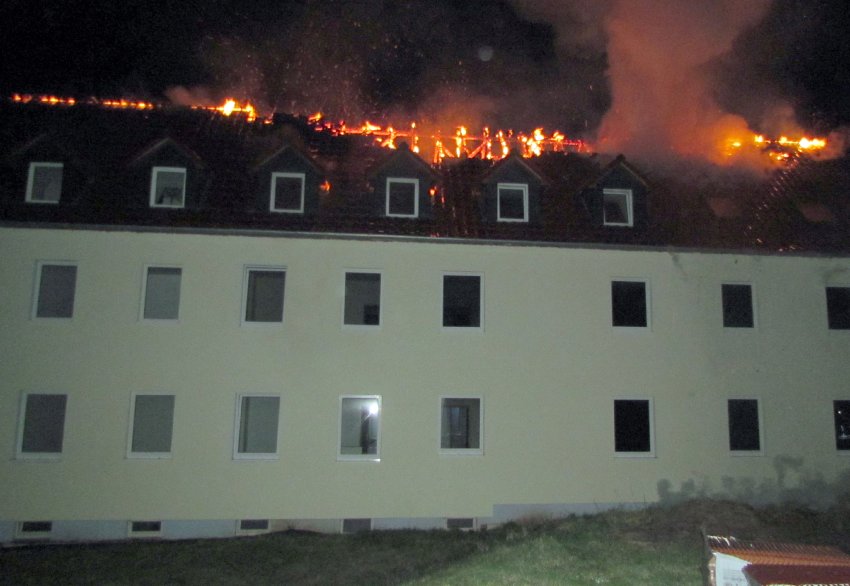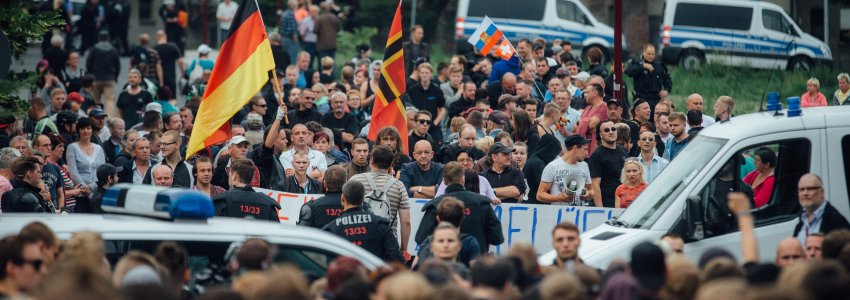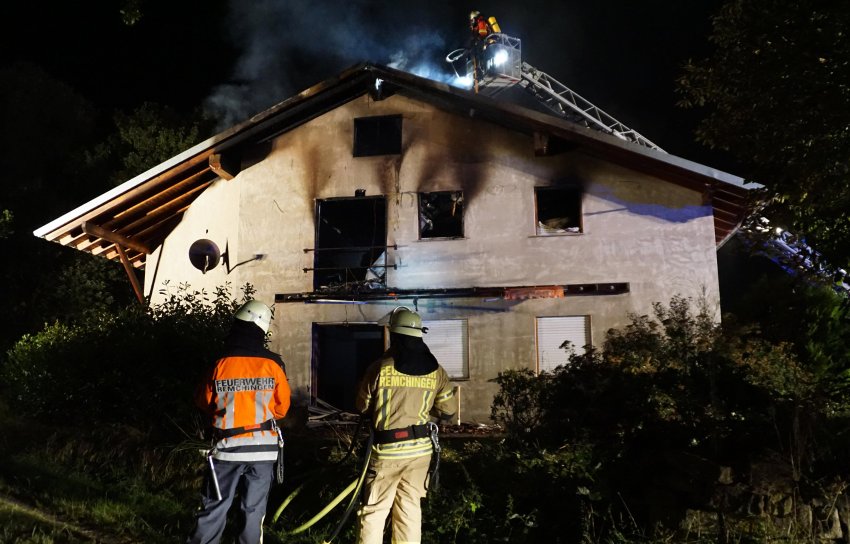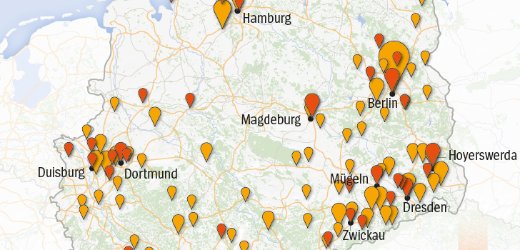Is the Ugly German Back? Flames of Hate Haunt a Nation
EUROPE, 27 Jul 2015
SPIEGEL Staff – TRANSCEND Media Service
During the first six months of this year, right-wing extremists in Germany committed attacks against places housing asylum-seekers on an almost daily basis. Many refugees living in the country fear for their lives.

In April, an arson attack was perpetrated against a building intended to provide accommodations for asylum-seekers in the city of Tröglitz in the eastern German state of Saxony-Anhalt. German officials registered an astonishing 173 instances of criminal right-wing offenses against accommodations for asylum-seekers during the first six months of this year, almost three times as many as during the same period the previous year.
24 Jul 2015 – It’s a Monday night in July and Samuel Osei is frightened to death. Two neo-Nazis have entered the concrete bloc apartment building where Osei is staying, on the edge of Greifswald, a city in eastern Germany. The two men are drunk and swearing. Osei, an asylum-seeker from Ghana, steps out on his balcony and tries to placate them. “I’m sorry,” he calls out. But the right-wing extremists only grow more aggressive. They begin shouting. One of the two takes off his shirt and Osei recognizes a swastika on his chest.
The men storm into the building and begin pounding on the door to Osei’s apartment. They then go down to the basement and remove the fuses, cutting off the power. Osei cowers in his room in the dark. He calls a friend who in turn alerts the police. The attackers have already left by the time officers.
Osei chokes up when he talks about that evening a week and a half ago. Traces of the attack are still visible — the door is dented and its peephole shattered. “These guys wanted to put an end to something,” he says.
Osei, who is 29, has been living in Germany for eight months. He’s taking German lessons and earns his money by helping other refugees move. Osei likes Greifswald, which is located on the Baltic coast — he especially likes the sea and the Old Town. He says most people in the city are friendly and helpful. At the same time, he’s struggling with the animosity he has experienced at the hands of racists.
One of the men involved in the attack had already cursed at him on the street. His mailbox at the apartment was also vandalized several times. The Ghanaian also has photos of the two attackers and has given a statement to the police. The state Office for the Protection of the Constitution, which is responsible for monitoring extremists, including neo-Nazis, in Germany, has also opened an investigation. “It was mental torture,” Osei says.
Germany these days is a nation split in two. On the one side is a populace that is showing greater solidarity with refugees than ever seen before. Initiatives have been created across the country to assist asylum-seekers in their everyday lives.
The other half of the country is extremely difficult to tolerate in some places. Racist violence is on the rise. The German Interior Ministry registered 173 instances of criminal right-wing offenses against accommodations for asylum-seekers during the first six months of this year, almost three times as many as during the same period the previous year.
Between January and June of 2015, racists attacked facilities providing accommodations for asylum-seekers on an almost daily basis. It’s a grim statistic, but the real figures may be even higher, because many refugees are afraid to report incidents to police. “We have to assume that further crimes will be committed against accommodations for asylum-seekers,” says Holger Münch, the president of Germany’s Federal Criminal Police Office.
German President Joachim Gauck recently condemned the attacks as “disgusting.” German Justice Minister Heiko Maas of the center-left Social Democrats (SPD), spoke of an “attack on our society.” But while these two German leaders are clearly worried about social stability in the country, other politicians seem to be fueling the tensions. Horst Seehofer, who heads the conservative Christian Social Union (CSU), the Bavarian sister party to Chancellor Angela Merkel’s Christian Democratic Union (CDU), swaggers on about “mass abuse of the asylum system.”
It has long been a cliché in Germany that most xenophobic attacks take place in the states that were formerly part of East Germany. Attacks recently have indeed been increasing in the east, but they are also on the rise elsewhere. There have been arson attacks against asylum-seeker hostels in Bavaria and Rhineland-Palatinate in the west, as well as calls by neo-Nazis to attack immigrants. Some of the scenes evoke the pogroms against migrants that plagued Germany during the 1990s. It begs the question: Has the “ugly German” returned?
Meissen, Saxony: In the Heart of Hatred
There had already been indications something would happen. Three weeks before refugees were supposed to move into a rental building in the historic center of Meissen, a city in the eastern state of Saxony near Dresden, unknown perpetrators posted a note on the door. In German and, just to be safe, in English, they demanded that the new arrivals leave Meissen as soon as possible. Building owner Ingolf Brumm contacted the police, but they didn’t see any need to look into the matter.

Many right-wing groups have also been using the Internet to stir xenophobic sentiment. A sampling of posts on Facebook shows the depth of hatred. Wolfgang writes: “Send the thieving gypsy vermin to internment camps and give them the right to stay there for the rest of their lives.” Astrid writes: “Yes, the people need to finally take a stand to defend themselves. We can’t just stand by and watch as our country is stolen.” Blaalaa writes: “They should be sent to Auschwitz for asylum. Convert it into accommodations.” Reno writes: “Because the shitty pack of Jews and Muslim slobber are taking more and more away from us, it is we who have no future in our country. It’s time to take up arms or whatever weapons you can get your hands on. Use them and defend yourselves. We need to annihilate the maggots.”
A short time later, the building went up in flames. The arsonist used an accelerant and the fire spread quickly. The soot covered three floors of the building right up to the ceiling. A new floor now has to be laid, and doors need to be torn out and replaced. In total, the fire caused over €200,000 ($219,530) in damage. “This was an attack with a message,” says Brumm.
The attack was far from an isolated incident in Saxony, where many similar crimes have been reported. The state has become a center for racist and right-wing extremist agitators. The xenophobic National Socialist Underground (NSU) terrorist cell responsible for killing nine immigrants, mostly Turks, between 2000 and 2006 found shelter and support in the city of Zwickau for years. The National Democratic Party (NPD), which has been described by the Office for the Protection of the Constitution as “racist, anti-Semitic and revisionist,” has been elected into the state parliament several times. The party lost the last election in the state, but just barely.
Part of the reason for the loss is attributable to the fact that the right-wing populists in the new Alternative for Germany party scored close to 10 percent in the vote. This past winter, thousands of supporters of the Patriotic Europeans against the Islamization of the West (Pegida) movement took to the streets of Dresden on Mondays in marches against Muslims and refugees. Now Saxony’s racists are gathering on a regular basis in front of an asylum-seekers hostel in the nearby town of Freital. The protesters shout epithets like “foreigners get out!” or “lying press,” a term used in an effort to manipulate public opinion against the press reporting on the xenophobic developments.
Saxony’s state government has given the right-wing extremists free reign for years. It was only recently that state governor Stanislaw Tillich of Merkel’s CDU finally brought himself to condemn the racist actions in the state parliament. In the past, his party had repeatedly sought to exploit the volatile atmosphere for its own political gain rather than take a stance against the hate-mongering. After the first Pegida protests, state Interior Minister Markus Ulbig even announced the deployment of special police units to combat criminal asylum-seekers.
In Meissen, which is world famous for its porcelain, Merkel’s CDU party has trouble distancing itself from right-wing populists. Pegida co-founder Thomas Tallacker even sat on the city council under the party’s banner. It took hate-mongering Facebook posts about “half-starved Ramadan Turks” and refugees he described as an “uneducated pack” for him to have to resign. He’s still a member of the party today. Meanwhile, District Administrator Arndt Steinbach believes the party needs to maintain a dialogue with supporters of the NPD. He has also suggested that prisons could be used to house refugees.
On a July night three weeks after the arson attack, around 400 followers of the “Homeland Protection” citizens’ group gathered for a demonstration in front of Meissen’s city hall. People from all walks of life were among the protesters — pensioners, fathers with their children in tow and even a former member of the state parliament with the NPD. They waved German flags. A cloth banner read, “Meissen rejects asylum fraud and the failure of politics.”
Stephane Simon from Leipzig gave a speech at the event. The activist is well-networked in the neo-Nazi scene and made appearances at the Pegida protests this winter. Now he talks of Germany’s downfall. “The arsonists aren’t the people who set the refugee hostel on fire,” he says later in the evening. “The arsonists are the politicians who had it built.”

Saxony’s racists meet on a regular basis in Freital, a town located near Dresden, where they shout epithets like “foreigners get out!” In the past, the neo-Nazi NPD party has also been voted into Saxony’s state parliament. It lost the most election in the state in part because of the rise of the populist Alternative for Germany party. The sign carried by these protestors reads, “No Place to Flee.”
Andreas Zick, the head of the Interdisciplinary Research on Conflict and Violence at the University of Bielefeld has been researching German prejudices against different groups for many years now. He’s says that although there are fewer racists in Germany today than in the past, those that do exist have also become more radical. The feelings of support they experience at anti-asylum protests like the one in Freital serve to empower them to act.
The police and officials at the Office for the Protection of the Constitution so far have no proof that the arsonists and agitators are forming a nation-wide network. Investigators are operating on the assumption that the crimes against asylum accommodations are being committed by individuals and very small groups. But crossover with organized extremism is frequent.
Halle: Everyday Terror
Egged on by local residents, neo-Nazis in Silberhöhe, a neighborhood in Halle, a city in the eastern state of Saxony-Anhalt, have been hunting down Roma for a year now, say officials at the state branch of the Office for the Protection of the Constitution. They claim perpetrators have attacked the migrants with knives and stun guns. Hundreds of Halle residents have joined the Facebook page “Residents of Silberhöhe Are Defending Themselves.” Several dozen right-wing extremists are meeting under the banner the “Halle/Saale Brigade.” The group is planning protests against refugees and also maintains ties with right-wing extremist groups.
The federal prosecutor in Karlsruhe has now issued an order for the Halle/Saale Brigade to be placed under observation. The brigade is also under the sights of the Office for the Protection of the Constitution. One investigator warns that no one can say which “group dynamic processes” are currently being unleashed in Germany. The investigator notes that the NSU also got its start with propaganda offenses and fake bombs.
Cheikna Hamala Fadiga has been forced to come up with his own rules for daily life in Halle. The first one is: “Fear is good. It protects you.” Fear is ever present when the immigrant from Mali in West Africa walks through the city center. “Am I safe here?” the 23-year-old asks. He avoids certain areas, like Silberhöhe and the football stadium. The second rule is: “When they call you the n-word and ask, ‘What are you doing here?’ you raise your voice. Clear and loud.” Fadiga then addresses them with, “Are you talking to me?” And that’s the third rule: “You have to have fear, but you can never show it — otherwise they’ve won.”
Fadiga has lived in Halle for the past three years. He came as a refugee. Two years ago, a group of young men mobbed him at the city’s train station. Following his own rules, he raised his voice so that other people passing by would hear. “Do you mean me?” he asked. Fadiga says they punched him in the face before he ran away, bleeding. He left his bicycle behind and they kicked it until it was destroyed.
Fadiga is sitting in the forecourt of the local university. The sun is shining and students can be seen playing guitars. Fadiga would like to go to college one day, but right now he is catching up and completing high school. A few months ago, he met with Reiner Hasloff, the governor of Saxony-Anhalt. The CDU politician spoke of immigration as an opportunity, Fadiga recalls, and about a welcoming culture. The latter term is being bandied about frequently in Germany these days as the number of immigrants and refugees increases. “But who can speak of a welcoming culture when we’re afraid for our safety.”
Mengerskirchen: Islam the Bogeyman
The anti-asylum agitators want to spread fear, foment unrest and delay the refugees’ move-in dates. In their propaganda, they make use of sentiment against blacks, Roma and Muslims. Muslim asylum-seekers are accused of being associated with the Islamic State terror organization, even though many of them fled from precisely that group.
Muslims were also the target of a July 1 attack in Mengerskirchen, in the central German state of Hessen. It was first noticed by newspaper deliveryman Hans-Werner Marek in the early morning, in front of a single-family home. There, Marek found half a pig head on some stairs and other pig remains spread around the building. Fifteen refugees were scheduled to move into the house. The words “go home” were written in red paint on the wall. “I was really ashamed to be German,” Marek says.
Three weeks later, owner Franz Lugert welcomed the home’s first residents, a Syrian-Palestinian family with five-year-old twins and a baby. Lugert didn’t tell them about the attack because he didn’t want to scare them.
Local activists and politicians who advocate for refugees also become targets of harassment. Right-wing groups like the “Dritte Weg,” or Third Way, try to disrupt asylum-related town hall meetings. A few days ago, there was an escalation at a discussion forum in Ludwigshafen am Rhein, in the Rhineland-Palatinate region, to which the president of the German Association of Cities, Eva Lohse, a lawmaker with the Christian Democrats, had been invited. Before the event began, the police reported that Dritte Weg cadres had handed out flyers protesting the “refugee hostels.” Participants claim the event itself was then torpedoed by members of the extreme right, who let loose boos, laughter and insults. Refugees were vilified as criminals, their supporters screamed down. “I’ve never experienced anything like that,” says Lohse.

A burned out asylum-seekers home in the city of Remchingen in the western state of Baden-Württemberg. The state government has done a lot of things right in terms of its refugee policy. And that has made the shock about the Remchingen fire even greater. State Governor Winfried Kretschmann described it as a “vile arson attack. We are ashamed that something like that could happen here.”
Many right-wing groups use the Internet to whip up antipathy. Facebook pages like “German patriotic resistance” or “Freital resists” are used to spread inhuman hate.
Christiane Schneider, leader of the political extremism department of the public youth protection watchdog jugendschutz.net, says the number of Internet pages with racist content has grown drastically in the past few months. “There is a country-wide network of these kinds of pages,” Schneider says. Many of them exist on the “thin line between legal expression of opinion and incitement of the people.”
The racism is also frequently overt. A shaved-headed man from the Allgäu, in southern Germany, rants on Facebook: “Because the shitty pack of Jews and Muslim slobber are taking more and more away from us, it is we who have no future in our country. It’s time to take up arms or whatever weapons you can get your hands on. Use them and defend yourselves. We need to annihilate the maggots!”
A man from Waldenburg in Saxony writes: “HEY YOU PARASITE … I’ll be in Freital next Sunday … I’ll get you, you deviant swine!!!! If the police won’t act, I’LL act. I’ll get you, you swine.” And a woman argues: “According to the media, refugees are to be housed in Buchenwald … all they have to do is turn the gas back on.”
Many of them posted their hateful tirades openly onto the Web with their full names, says youth protection worker Schneider. “The whole thing has reached a kind of degree of normality.”
Tegernsee: Middle Class Protest
Racism isn’t limited to the neo-Nazi scene, to the prefab estates of the former East or to people with little education. There is also resentment against the refugees in the middle class, among the wealthy and the very wealthy.
The inhabitants of Tegernsee, in the Bavarian region of Oberbayern, are largely upper middle class. Businesspeople, lawyers and doctors live here, amidst turquoise-blue water and green mountains.
Some local citizens regularly met in the Waakirchen community gymnasium to bowl, often multiple times per month. The bowlers allowed the tenant of the Kegelstüberl, Stefan Heufelder, to earn decent income. But since the authorities began housing 21 refugees in the basement of the gymnasium in late April, the customers have stayed away.
Instead, Heufelder got calls from upset customers. They complained that they didn’t want to stand shoulder to shoulder with “blacks” at the urinal, or run into them during their smoke breaks at the tavern. Heufelder was horrified by his customers’ reactions. “These are people from well-to-do circles,” he says. “You wouldn’t expect something like that.”
Rumors are spreading locally: The refugee applicants from Syria, Eritrea, Mali and Senegal are reportedly bringing in disease. The parents of primary-school children asked the community to separate the school’s yard from the gymnasium with a fence and privacy screen, purportedly to protect the privacy of the refugees in the basement.
Waakirchen’s mayor, Sepp Hartl, tried to defuse the anger. “The refugees may have differently colored skin, but they are people with a heart and soul,” he told the public broadcaster Bayerischer Rundfunk. Now he’s receiving threatening letters.
Because Hartl wants to set up containers for refugees in the town, people protested a meeting he attended in May. Owners are afraid that homes in the area will lose value.
According to Bielefeld conflict researcher Andreas Zick, German politicians and society are too tolerant of anti-refugee sentiment. He argues that the state has pushed back sexism and homophobia, but too little has been done to combat stereotypes about asylum-seekers. Members of the educated classes, of all people, tend to view refugees as economically worthless, Zick says.
Only a small number of people with anti-refugee sentiments have ever come into contact with refugees. They know very little about the experiences of those looking for safe haven, or about their often extremely perilous odyssey to Germany. That ignorance makes it easier for them to demonize refugees as dangerous.
Hilda: Refugee Stigma
The worst, Osman says, is the waiting. “The waiting makes us sick.” For seven months, Osman, a 32-year-old IT expert from Syria, has been living in a refugee shelter in Hilden, a suburb of Düsseldorf. He shares a small room with three other men, and can’t wait for the authorities to make a decision about his refugee status.
Individual communities like nearby Leverkusen or Wuppertal house the majority of their refugees in apartments. But the authorities usually place them in so-called collective housing — in schools, gymnasiums or containers at the edge of the city. The refugees often feel isolated from society in the camps.
The people living in Hilden’s shelters claim they were bullied by employees of the immigration office. A female refugee says helpers from the city were banned from donating a washing machine. The office disputes this.
Osman speaks perfect English. He would like to work and make money for his family, which has been stuck in Lebanon ever since they fled from Syria. But the law makes it more difficult for refugees to search for work. Although asylum-seekers are allowed to find a job three months after they arrive, in most cases employers need to prove that they couldn’t find any qualified German or EU applicants before they can hire an asylum-seeker.
Politicians ask Germans to have more solidarity with migrants, but the country’s public institutions themselves play a role in the establishment of racist fears. People of color are more often stopped at train stations and in trains. The United Nations has described this practice as a form of “racial profiling.”
In early July, just a few days after the refugee home in Meissen caught fire, the federal parliament, the Bundestag, agreed to toughen Germany’s refugee law. In the future, refugees coming to Germany with the help of smugglers and those circumventing border controls could lose their passport, and asylum-seekers making false statements to authorities could be arrested. German Interior Minister Thomas de Maizière of the CDU said that the tough approach to the new arrivals is necessary in order to secure public “approval for immigration and the entry of people in need of protection in Germany,” as if Germans were somehow more likely to approve of asylum policies if some of the refugees were detained.
Remchingen: The End of an Illusion
The frame of the roof truss is visible from afar, the black beams rising up like a memorial in the blue summer sky. From close up, visitors can spot evidence of the fire’s power — broken roof tiles on the ground, soot covering the facade above the window openings.
Refugees were supposed to move into the building in Remchingen, near Karlsruhe, shortly. The people responsible have yet to be caught — it remains unclear what caused the fire, but the Karlsruhe Criminal Police believe it was likely arson. The fire, which took place in the night of the Saturday before last, didn’t merely destroy the building, it also destroyed an illusion: that right-wing attacks take place in the former East, not in West German neighborhoods.
The state government of Baden-Württemberg had done lots of things right when it came to refugee policy. The state has an Integration Ministry at its disposal and State Governor Winfried Kretschmann, a member of the Green Party, organizes refugee summits that bring together representatives from society and the municipalities, with the goal of strengthening solidarity.
But that only makes the shock about the Remchingen fire bigger. Kretschmann describes it as a “vile arson attack.” The district administrator says, “We are ashamed that something like that could happen here.”
Remchingen’s mayor, Luca Prayon, sits perplexed in his office a few days after the event. He looks exhausted. What went wrong?
Prayon talks about the things that are going well in his community. A week before the fire, locals and refugees celebrated a farm festival together. This Sunday, the local council has invited people to join a rally for a “cosmopolitan and pluralistic county.” There is also to be a minute of silence.
But it was likely no coincidence that the fire took place in Remchingen. The region has been considered a right-wing hotspot for years. Homeowners who wanted to sell their buildings to the community so they could be used as refugee homes received threatening letters. Shortly after the fire, the members of Die Rechte Enzkreis, a right-wing group, put flyers in mailboxes. “Fraud has many faces,” they said. And “why the expensive integration courses?”
In a neighboring community, people formed an anti-refugee initiative hoping to use a public petition to block the opening of a refugee hostel. It didn’t take long for them to find the supporters they needed for the petition.
DISCLAIMER: The statements, views and opinions expressed in pieces republished here are solely those of the authors and do not necessarily represent those of TMS. In accordance with title 17 U.S.C. section 107, this material is distributed without profit to those who have expressed a prior interest in receiving the included information for research and educational purposes. TMS has no affiliation whatsoever with the originator of this article nor is TMS endorsed or sponsored by the originator. “GO TO ORIGINAL” links are provided as a convenience to our readers and allow for verification of authenticity. However, as originating pages are often updated by their originating host sites, the versions posted may not match the versions our readers view when clicking the “GO TO ORIGINAL” links. This site contains copyrighted material the use of which has not always been specifically authorized by the copyright owner. We are making such material available in our efforts to advance understanding of environmental, political, human rights, economic, democracy, scientific, and social justice issues, etc. We believe this constitutes a ‘fair use’ of any such copyrighted material as provided for in section 107 of the US Copyright Law. In accordance with Title 17 U.S.C. Section 107, the material on this site is distributed without profit to those who have expressed a prior interest in receiving the included information for research and educational purposes. For more information go to: http://www.law.cornell.edu/uscode/17/107.shtml. If you wish to use copyrighted material from this site for purposes of your own that go beyond ‘fair use’, you must obtain permission from the copyright owner.

[…] Is the Ugly German Back? Flames of Hate Haunt a Nation […]